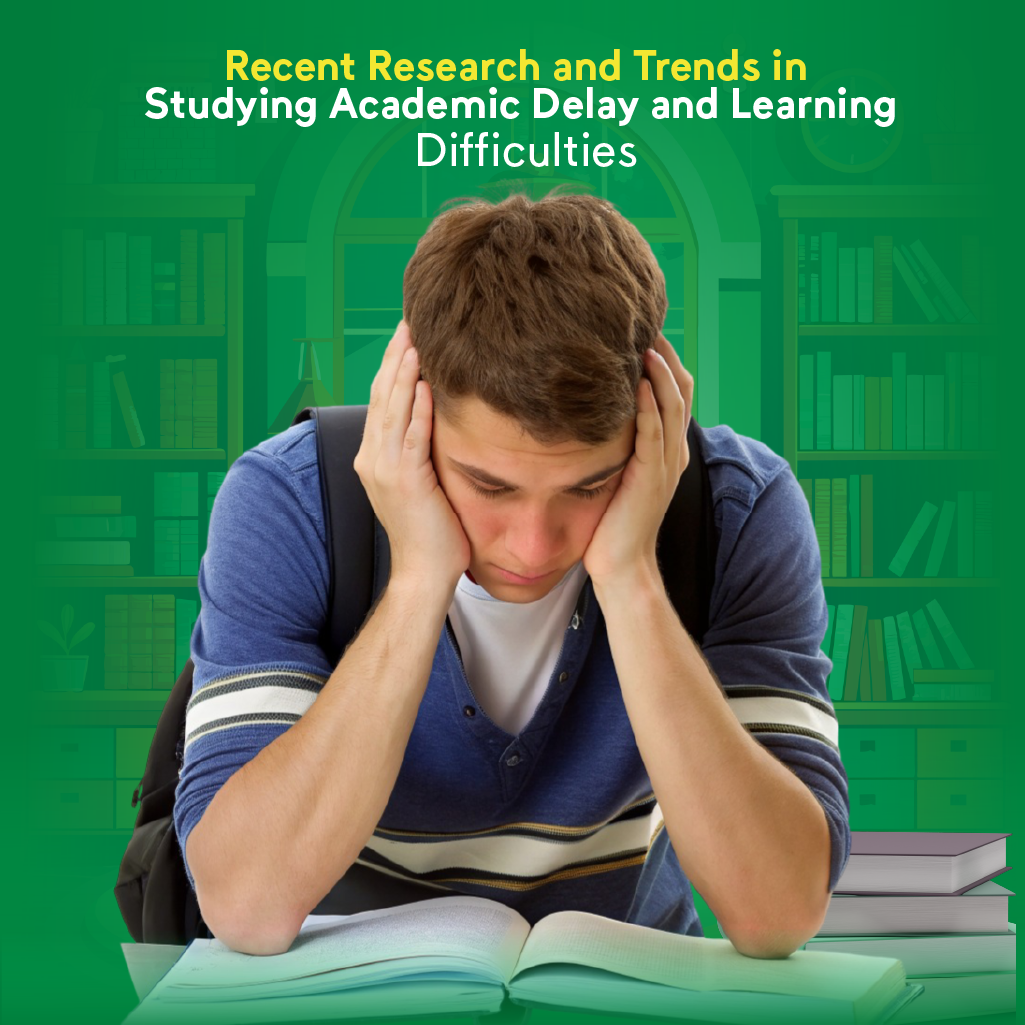
Academic Delay and Learning Difficulties are among the most significant challenges facing educational systems worldwide. Addressing these issues requires a deep understanding of the underlying causes and influencing factors, as well as the development of effective strategies to support affected students. In recent years, the field of studying learning difficulties and academic delays has seen substantial progress, thanks to contemporary research that sheds light on innovative methods and new technologies to tackle these problems. This article aims to review the most prominent research and recent trends in this field, emphasizing the importance of early diagnosis, diverse educational interventions, and the role of modern technology in improving educational outcomes for students.
Understanding Academic Delay and Learning Difficulties
Clear Points on the Meaning of Academic Delay and Learning Difficulties:
Academic Delays:
- Academic delay refers to a situation where a student does not make academic progress consistent with their age or grade level.
- This delay results in the student lagging in acquiring the skills and knowledge expected at their current stage of education.
- Causes of academic delay can be varied, including social and family factors, health or psychological issues, and inadequate educational support.
- Academic delay can negatively impact a student’s self-esteem and future academic performance.
- Addressing academic delay requires immediate intervention and specialized support to improve the student’s performance and enhance their chances of academic success.
Learning Difficulties:
- Learning difficulties encompass a range of issues that hinder individuals from understanding or executing basic educational skills such as reading, writing, and mathematics.
- These difficulties include problems with grasping concepts, memory and retrieval challenges, and issues with concentration and attention.
- Learning difficulties may stem from genetic factors, environmental influences, or learning disorders like ADHD.
- They affect both academic and social performance, increasing educational and psychological challenges.
- Effective approaches to learning difficulties involve individualized strategies and specialized support to meet the needs of affected students and boost their educational success.
Types of Learning Difficulties and Their Impact on Students
Clear Points on Types of Learning Difficulties and Their Impact on Students
Dyslexia:
Definition: Difficulty in learning to read and write, characterized by trouble recognizing and spelling words correctly.
Impact: Affects the ability to read texts quickly and accurately, leading to poor reading comprehension and lower academic performance in reading-dependent subjects, after that, we must recover Academic Delay and Learning Difficulties.
Dysgraphia:
Definition: Difficulty with handwriting and written expression.
Impact: Students struggle to organize and articulate their thoughts in writing, which affects performance in exams and assignments requiring extensive writing.
Dyscalculia:
Definition: Difficulty in understanding numbers and arithmetic operations.
Impact: This leads to challenges in learning basic math skills, such as addition, subtraction, multiplication, and division, affecting performance in science and math subjects.
Nonverbal Learning Disabilities (NLD):
Definition: Difficulties with motor skills and visual-spatial perception.
Impact: Students face challenges in social interactions and solving problems that require visual and spatial thinking, affecting performance in subjects involving charts and diagrams.
AttentionDeficit/Hyperactivity Disorder (ADHD):
Definition: A disorder characterized by inattention, hyperactivity, and impulsivity.
Impact: Students struggle with focus and maintaining attention, affecting their ability to complete academic tasks and engage in educational activities, after that, we must recover Academic Delay and Learning Difficulties.
Language Processing Disorder:
Definition: Difficulty in understanding and using spoken and written language.
Impact: Students have trouble following instructions and expressing ideas verbally and in writing, impacting communication and academic performance.
Auditory Processing Disorder:
Definition: Difficulty processing and understanding auditory information despite normal hearing.
Impact: Students find it hard to follow verbal instructions, distinguish sounds in noisy environments, and comprehend spoken language, affecting classroom performance.
Visual Processing Disorder:
Definition: Difficulty interpreting and processing visual information.
Impact: Students struggle with reading, writing letters and numbers correctly, and coordinating visual motor tasks, affecting academic performance in reading and writing.
Developmental Coordination Disorder:
Definition: Difficulty in executing and coordinating physical movements.
Impact: Students have trouble with fine motor skills such as writing and using tools, impacting performance in activities requiring motor coordination, after that, we must recover Academic Delay and Learning Difficulties.
Nonverbal Learning Disorder:
Definition: Difficulty with nonverbal skills such as motor coordination, visual-spatial understanding, and social relationships.
Impact: Students struggle with interpreting nonverbal cues, affecting social interactions, motor skills, and academic performance.
Working Memory Disorder:
Definition: Difficulty retaining and using information for short periods.
Impact: Students face challenges in following complex instructions and completing multi-step tasks, affecting daily academic performance.
Recent Research in Academic Delay and Learning Difficulties
Key Points on Recent Research in Academic Delay and Learning Difficulties
Development of Specialized Teaching Strategies:
Research: Study on the impact of using specialized teaching strategies to improve the performance of academically delayed students.
Findings: Interactive methods such as project-based learning and cooperative learning significantly enhance students’ comprehension and engagement.
Use of Technology in Education:
Research: Evaluation of the effects of technological tools like educational apps and interactive programs on academically delayed students.
Findings: Research indicates that technology increases student motivation and engagement, thereby improving their understanding of educational content.
Early Interventions and Diagnosis:
Research: Study on the benefits of early diagnosis of learning difficulties and the provision of early interventions.
Findings: Early intervention can significantly reduce the impact of academic delays and improve long-term academic performance, after that, we must recover Academic Delay and Learning Difficulties.
Psychological and Social Factors:
Research: Analysis of the effects of psychological and social factors such as anxiety, depression, and family issues on academic delays.
Findings: Students receiving psychological and social support show marked improvement in academic performance compared to those who do not.
Specialized Educational Programs:
Research: Evaluation of the effectiveness of specialized educational programs designed to support academically delayed students.
Findings: Programs that include clear and direct instructions, additional teacher support, and interactive activities significantly improve student performance.
Nutrition and Physical Health:
Research: Study on the relationship between nutrition, physical health, and academic delays.
Findings: Proper nutrition and regular physical activity contribute to improved concentration and academic performance.
Social and Emotional Learning:
Research: Analysis of the impact of social and emotional learning programs on academically delayed students.
Findings: Enhancing social and emotional skills helps improve academic behavior and motivation among students.
School Environment and Support:
Research: Study on the impact of a supportive school environment on reducing academic delays.
Findings: Schools that provide a positive and supportive environment, along with academic and psychological support programs, show lower rates of academic delays.
Importance of Early Diagnosis of Learning Difficulties
Key Points on the Importance of Early Diagnosis for Academic Delay and Learning Difficulties
Provision of Early Support:
Early diagnosis allows for the provision of early support and interventions for students struggling with learning difficulties. This includes academic support programs and individual assistance, enhancing academic success.
Prevention of Academic Delay:
Early diagnosis helps identify and address difficulties before they significantly impact a student’s academic progress. This reduces the risk of academic delay and helps students reach their full potential.
Effective Educational Planning:
Early diagnosis aids in identifying students’ needs, allowing for the planning of appropriate educational programs that effectively meet those needs.
Comprehensive Support:
Early diagnosis enables families, teachers, and specialists to collaborate in providing comprehensive support, addressing academic, psychological, and social aspects for students with learning difficulties.
Long-Term Academic Improvement:
Early diagnosis and intervention lead to improved academic outcomes in the long term, enhancing students’ chances of academic excellence and future success.
The Role of Family in Supporting Students with Academic Delay and Learning Difficulties
Key Points on the Role of Family in Supporting Students with Learning Difficulties:
Emotional and Psychological Support:
Parents play a crucial role in providing emotional and psychological support, helping to build self-confidence and motivation for learning.
Communication with the School:
Continuous communication between the family and the school helps better understand the student’s needs and provides appropriate support both inside and outside the classroom.
Support with Homework:
Parents can assist students in managing homework and encouraging academic discipline, which contributes to improved academic performance.
Enhancing Basic Skills:
Families can enhance reading, writing, and arithmetic skills through appropriate home activities, fostering educational independence.
Participation in Individualized Education Plans:
Families should collaborate with the school and specialists to develop individualized education plans tailored to the student’s needs, providing necessary support to achieve educational goals.
Challenges Faced by Researchers in Academic Delay and Learning Difficulties
Here are some challenges that researchers in the field of Academic Delay and Learning Difficulties:
Complexities in Definition and Classification:
Challenge: Difficulty in standardizing the definition and classification of academic delays, as definitions and metrics can vary from one study to another, complicating the comparison of results and critical analysis.
Methodological and Research Complexities:
Challenge: Difficulty in selecting and applying appropriate research methodologies that allow for a deep understanding of the causes and effects of academic delays, and providing effective recommendations for educational interventions and policies.
Data and Sample Challenges:
Challenge: Difficulty in collecting sufficient and representative data on academically delayed students, and managing variations in samples and the environmental and social conditions of students.
Evaluation and Measurement Difficulties:
Challenge: Difficulty in developing suitable assessment tools that accurately measure various aspects of academic delays and identify effective interventions to improve academic outcomes.
Ethical and Legal Challenges:
Challenge: Maintaining the privacy and confidentiality of personal information of students participating in studies, and ensuring all research adheres to established ethical and legal standards.
Financial and Resource Challenges:
Challenge: Limited funding is available for research in this field, which can affect the ability of researchers to conduct comprehensive and long-term studies.
Strategies to Support Students with Special Needs
Here are effective strategies to support students with special needs:
Interactive Learning and Modified Curriculum:
Providing modified curricula that meet the needs of students, including interactive teaching methods that engage all students.
Individualized Support:
Allocating resources and individualized support for students based on their needs, through support teachers or special education staff.
Assistive Technology:
Providing assistive technology such as specialized learning software and technological tools that help students achieve academic success.
Cooperative Learning and Small Groups:
Organizing students into small groups to collaborate on projects and educational activities, enhances interaction and mutual learning.
Continuous Assessment and Immediate Feedback:
Implementing a continuous assessment system that provides timely and appropriate feedback to students, helping them identify strengths and weaknesses and improve performance.
Encouraging Independence and Responsibility:
Promoting skills of independence and responsibility in students by giving them opportunities to make decisions and actively participate in learning processes.
Enhancing a Supportive Educational Environment:
Creating a supportive educational environment that includes emotional and psychological support for students, encouraging their active participation in all school and community activities.
These strategies aim to enhance the learning experience and academic success of students with special needs, ensuring they have equal and inclusive educational opportunities.
The Impact of Digital Technology on Students with Learning Difficulties
The impact of technology on Academic Delay and Learning Difficulties can be summarized in the following points:
Increased Access to Educational Resources:
Digital technology provides access to a wide range of educational resources tailored for students with learning difficulties, helping them understand concepts in diverse and interactive ways.
Personalized Learning:
Technology can be used to customize learning according to each student’s needs, allowing them to progress at their own pace.
Enhanced Interaction and Engagement:
Educational applications and technological tools increase student engagement and interaction with educational content, motivating and enhancing their involvement in lessons.
Improved Communication and Collaboration Skills:
Digital technology enhances communication and collaboration skills among students through collaborative learning platforms and group projects online.
Immediate Feedback and Multimedia Assessment:
Digital technologies enable teachers to provide immediate feedback and assess students using multimedia tools like video, audio, and text, enhancing learning effectiveness for students with learning difficulties.
Encouragement of Independence and Self-Motivation:
Digital technology fosters student independence and self-motivation by providing educational resources accessible anytime and anywhere.
Enhanced Learning Experiences:
Technology can offer improved learning experiences by presenting difficult concepts in visual and interactive ways, enriching the educational experience for students with learning difficulties.
The Role of Elmadrasah.com in Overcoming Learning Difficulties and Academic Delays
Elmadrasah.com is a distance learning institution in the UAE, offering online education in various subjects for all levels. It employs modern techniques to address Academic Delays and Learning Difficulties through specialists. Their approach includes:
Providing Diverse Educational Programs:
Elmadrasah.com designs specialized educational programs catering to the needs of students with learning difficulties, including individual lessons and early interventions.
Adopting Effective Teaching Strategies:
The institution develops innovative teaching strategies that enhance student understanding and engagement, aiding in academic improvement and progress.
Offering Psychological and Social Support:
They provide a supportive environment that encourages personal and social growth for students with academic delays, boosting their self-confidence and desire to learn.
Collaborating with Parents and the Community:
They play a crucial role in communicating with parents and the local community to understand student challenges and provide appropriate support.
Research and Development:
The academy contributes to enhancing knowledge about learning difficulties and academic delays through research and development, leading to improved educational policies and practices.
By investing in these areas, Elmadrasah.com aims to make significant progress in overcoming educational obstacles and enhancing learning opportunities for all students, contributing to more inclusive and advanced educational communities.
In conclusion, amidst the increasing challenges faced by the educational system today, the importance of studying Academic Delay and Learning Difficulties is highlighted by analyzing the current and future state of education and learning as a vital and evolving field of research. Recent research has shed light on the causes and impacts of academic delays on students and communities, prompting the development of advanced educational strategies and effective support programs. We are witnessing progress in understanding learning difficulties, focusing on early diagnosis, and providing effective treatments that meet individual student needs. Through continuous research and innovation.















